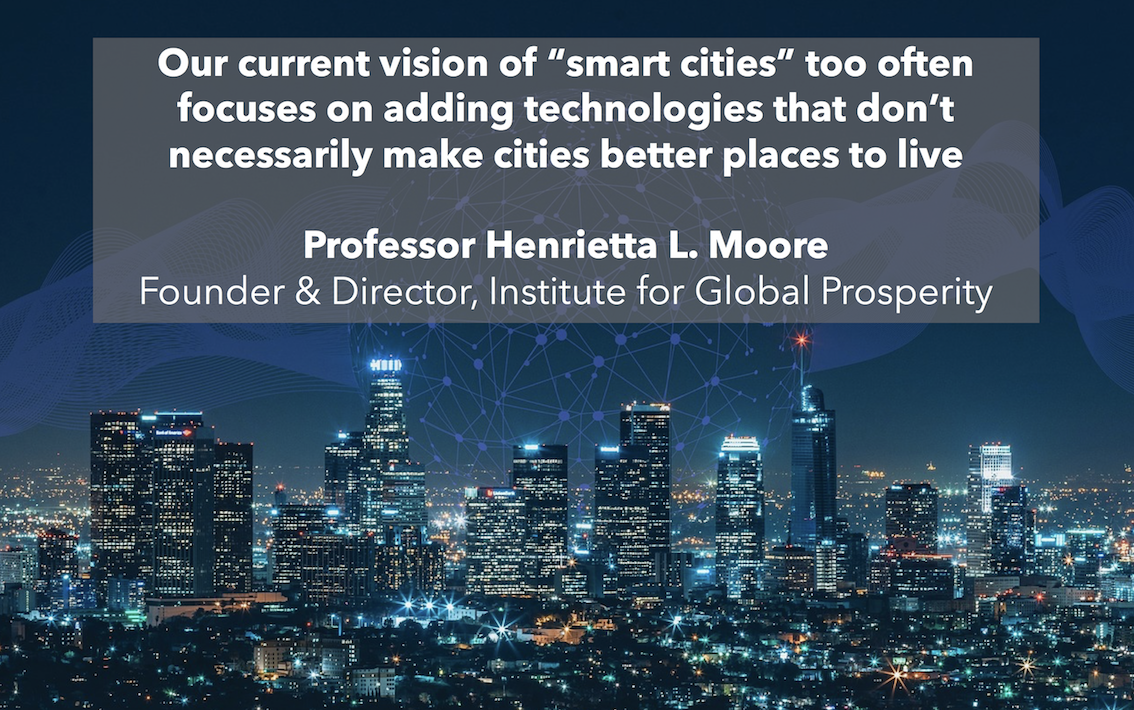Professor Henrietta L. Moore
Smart cities are built upon a foundation of sustainable prosperity that actually improves the quality of life for all and their experience of urban living.
There are 7.7 billion people on the planet today, and every year our global population grows by around 1.08% – or around 82 million people. It is estimated that by 2050, 70% of the world’s population will be living in cities. The cities we know now will have changed and adapted to accommodate for this. How will we ensure they do so in a way that improves the quality of life its residents?
Cities are engineered to be shaped by, and respond to, different human needs. However changes to the urban landscape can be unpredictable and are not able to meet every challenge that urbanites experience in the everyday. There are many factors that dictate the issues we choose to prioritise and address, but health is one thing we all share that cannot help but be affected by our environment. As more of us live in cities, we are becoming increasingly aware of the elements beyond our immediate control that impact upon our wellbeing: be that air pollution, amount of and access to green space, or transport. The difficulties of being healthy in an urban context are now recognised the world over.
One of our greatest engineering challenges today then is: how do we create an ecological city of the future that is beneficial for us to live in? One that is supported by science and technology, rather than suffers from it? This is not just a matter of cutting emissions, but of recognising that urban sprawl is going to put more pressure on energy, on water, and on agricultural land. It is also going to create more waste and air pollution, the latter of which is already proving deadly to some populations around the world today. We need cities that will be able to cope with these strains.
At the moment, when we think about the cities of the future, we often talk about “smart cities”. For some, this can conjure images of drones in the sky, or self-driving taxis. However, these already familiar scenes are more “technological” than “smart”. Smart cities are cities that are genuinely better places to live. They are cities that are built upon a foundation of sustainable prosperity that actually improves the quality of life for all and their experience of urban living. Designing smart cities is a challenge for engineers, as it forces them to rethink their approach to the urban landscape, and acknowledge and address social elements to greater extent. For example, underpinning the urban situation we currently have is a huge crisis around social inequality. It follows then that any solution attempting to address this needs to take this into account – those created by engineers included. If the cities of the future have to be different, then the engineering that underpins them has to be different too.

Image credit: Tumisu - Pixabay
In my opinion, the challenges we face in cities today need to be brought to the forefront of the engineering endeavour. While this may already be happening, very often there is still a tendency to want to create immediate technological solutions to urban problems. Even if we have engaged imaginatively with them, we want to quickly move on once we think the challenge has been addressed. Instead, it would serve us well to take more time to consider the major challenges of the day and prioritise which, if tackled now, would be more likely to positively impact upon the broader context of contemporary city life. In order to do this, we need to consider the ethics of engineering to greater extent.
At its heart, engineering should begin with ethics – with equity, quality of life and improvement. It ought to be progressive, but not progressivist. In other words, engineering should aim to offer opportunities to build the capacities and capabilities of infrastructure that matter to people. It should give them new ways of interacting with others and aim to improve the quality of the environment that they live in, but in a way that does not dictate what they want in life. Ultimately, the big challenges we face, and the engineering solutions we are proposing for them, all in some way all revolve around ethics.
Thinking about 10 billion people on the planet and the cities that they will live in means, I think, thinking about the different ways of interacting with people. It means different ways of caring about each other, about our environments, and the quality of life we are all able to enjoy together. At its heart this is an issue of equity and sharing, and that must underpin all discussions we have about future cities, today.
Prof Moore spoke at this week’s Global Grand Challenges Summit in London, hosted by the Royal Academy of Engineering, the US National Academy of Engineering and the Chinese Academy of Engineering
#TheWayForward #ClimateEmergency
Read the article, Engineering a sensible smart city, in full here
Fatemeh Sadeghi
30 May 2024 Feminists in the Global South have stepped out of the conventional territories of ‘women’s matters’ into more fund...